File Photo/OpenAI
Less than 36 hours after OpenAI dropped the “bomb” with its new model ChatGPT-4o, the company made another major announcement.
On the morning of May 15th (Wednesday), Beijing time, OpenAI announced that its Chief Scientist and Co-founder, Ilya Sutskever, will be stepping down, ending months of speculation in Silicon Valley about the top AI researcher’s future. Last November, there was turmoil within OpenAI’s management, and Sutskever was thought to be the instigator behind the scenes.
Subsequently, OpenAI stated on its blog that Sutskever’s position will be taken over by Research Director Jakub Pachocki.
From studying neural networks under Geoffrey Hinton, known as the “godfather of modern artificial intelligence,” to working in Google’s Brain lab, and then to being the Chief Scientist and Co-founder of OpenAI, Sutskever has driven the development of large language models over the past nearly ten years, helping to shape the fields of deep learning, neural networks, and generative artificial intelligence.
Regarding the future, Sutskever mentioned in his X tweet that he is starting a new project but did not reveal any details.
OpenAI’s Chief Scientist Resigns to Start a New Venture
On May 15th, Beijing time, Ilya Sutskever, the co-founder and Chief Scientist of OpenAI, announced on the X platform that he will be leaving OpenAI.
Sutskever stated, “After nearly a decade, I have decided to leave OpenAI. The company’s trajectory has been nothing short of miraculous, and I believe OpenAI will build a safe and beneficial AGI under the excellent leadership of Altman, Brockman, and Murati. It has been an honor to work with everyone, and I will miss you all dearly. Goodbye, and thank you for everything. I am looking forward to my next plan—a project of great personal significance to me, details of which I will share when the time is right.”
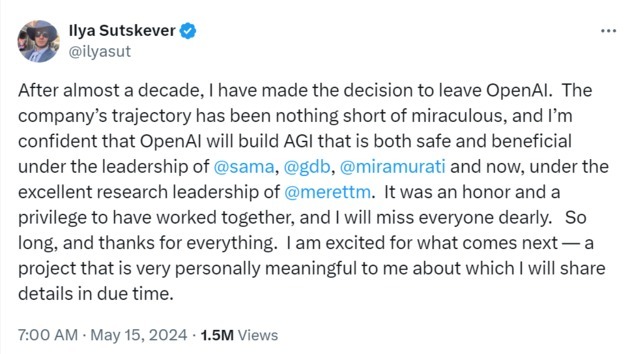
Photo/X
Sam Altman, CEO of OpenAI, also tweeted his response, expressing his sadness about Sutskever’s departure. “It saddens me. Sutskever is undoubtedly one of the greatest minds of our generation, a guiding light in our field, and a dear friend. His talent and vision are well-known, and his passion and compassion, though less known, are equally important. Without Sutskever, OpenAI would not be where it is today.”
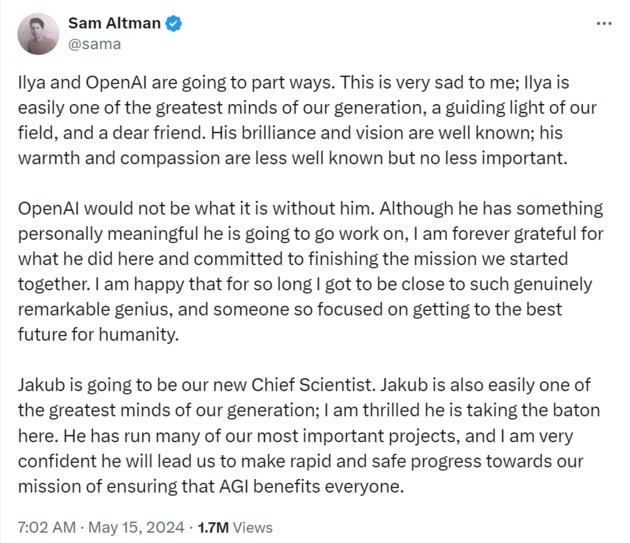
Photo/X
Greg Brockman, President of OpenAI, wrote on X, “Sutskever is an artist. His vision and passion are infectious, and he helped me understand this field when we were just starting out. He is not afraid to draw logical conclusions from intuition… The mission is far from complete, and Sutskever has played a key role in helping OpenAI get to where it is today. Thank you for everything.”
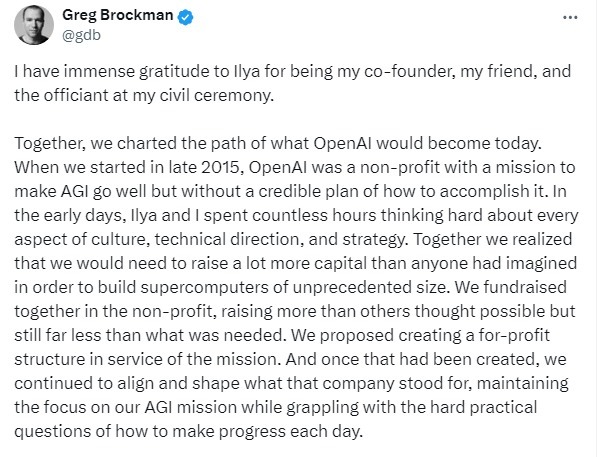
Part of Brockman’s tweet Photo/X
According to The Washington Post, Sutskever is a staunch believer in general artificial intelligence, which typically refers to AI systems that are smarter than humans. While many of OpenAI’s competitors were skeptical of this technology, Sutskever’s support propelled the development of large language models, and his work at OpenAI helped shape the fields of deep learning and generative artificial intelligence.
Sutskever, who studied under Geoffrey Hinton, the “godfather of modern artificial intelligence,” served as a postdoctoral researcher at Stanford University. Before joining OpenAI, Sutskever had already made a name for himself with his neural network research at the University of Toronto and his work at Google’s Brain lab.
When OpenAI was founded in 2015, Musk actively invited him to join. Legal documents reveal, “Dr. Sutskever deliberated over whether to leave Google to join OpenAI, but it was ultimately Musk’s call on the day OpenAI was publicly announced that persuaded Dr. Sutskever to join the company as its Chief Scientist.” As a core figure at OpenAI, Sutskever even officiated President Greg Brockman’s wedding in the company’s office.
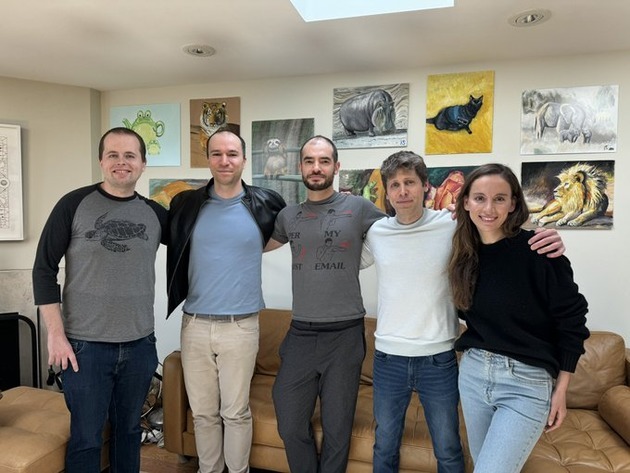
Sutskever (third from left) posted a photo with OpenAI executives Photo/ X
The New York Times reported that after joining OpenAI, Sutskever was involved in AI breakthroughs concerning neural networks, a technology that has significantly advanced the field over the past decade. Last year, Sutskever was named one of the top ten scientists of the year (Nature’s 10) by Nature, described as a pioneer of ChatGPT and other AI systems that have changed society.
Once considered the behind-the-scenes instigator of OpenAI’s “palace intrigue,” Ilya Sutskever was part of a management shake-up at OpenAI last November. The board announced that Altman had resigned as CEO and left the company, with Chief Technology Officer Murati stepping in as interim CEO.
At that time, Reuters reported that an internal letter from OpenAI researchers warning about the dangers of the “Q*” project was the catalyst for Altman’s dismissal. The progress made on Q* led some within the company to believe they might have found a breakthrough in “General Artificial Intelligence (AGI).”
However, less than a week later, Altman returned to the company as CEO, and the turmoil ended. But Sutskever and two others who initiated Altman’s firing were not listed as members of the new board.
Tesla CEO Musk once said, “Ilya has a good moral compass and does not prioritize power. He would not take such drastic action unless he felt it was absolutely necessary.”
After Altman’s reinstatement in late November last year, he stated in a blog post that Sutskever would no longer serve on the board, and the company was “discussing how he could continue to work at OpenAI.” In the months that followed, Sutskever largely disappeared from public view, sparking speculation about whether he would remain at OpenAI.
At a press conference in March this year, when asked about Sutskever, Altman said he believed Sutskever loved OpenAI deeply and added, “I hope we can work together again in the future.”
But ultimately, Sutskever has now left the company he worked at for nearly a decade.
Replacing Sutskever is OpenAI’s Research Director Jakub Pachocki. Regarding Sutskever’s decision, Pachocki wrote on X, “Ilya introduced me to the world of deep learning research and has been my mentor and great collaborator for years. It is his incredible vision for deep learning that has led to the achievements of OpenAI and the AI field today. I am deeply grateful to him.”
Pachocki joined OpenAI’s Dota team in 2017 as a research lead, where the team later developed an AI system capable of defeating human players in Valve’s Dota 2 strategy game. Subsequently, Pachocki became the research lead for OpenAI’s reasoning and deep learning science division and has served as OpenAI’s Research Director since last August. Pachocki led the development of GPT-4 and OpenAI Five, as well as foundational research in large-scale RL and deep learning optimization.
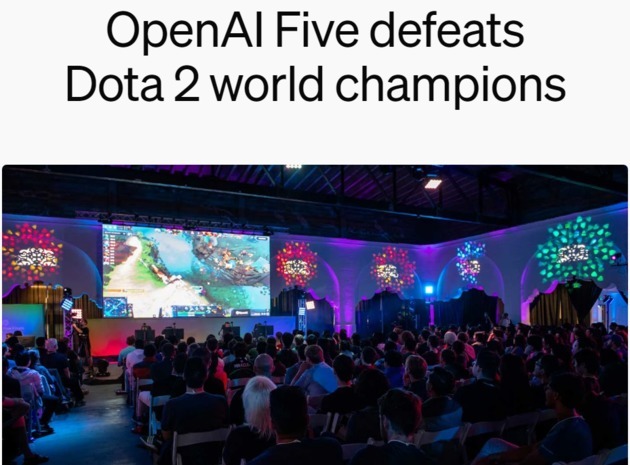
Photo/OpenAI
Pachocki’s passion for AI began with the release of AlphaGo, when he realized the potential of deep learning far exceeded the capabilities of computers at the time. Despite playing a key role in the development of GPT-4 and achieving significant accomplishments, Pachocki has remained low-profile, rarely appearing in the media.
Altman once praised Pachocki, saying, “Jakub Pachocki’s exceptional leadership and technical foresight in the pre-training work of GPT-4 were incredible. Without his contributions, we could not have achieved what we have today.”


 川公网安备 51019002001991号
川公网安备 51019002001991号





